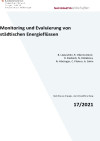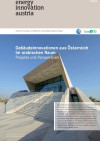Suchergebnisse
BAU-LAND-GEWINN ohne Erweiterung - Weiterentwicklung von Einfamilienhaus-Siedlungen

Verdichtungs- und Umnutzungspotenziale in erneuerungsbedürftigen Einfamilienhaus-Siedlungsräumen erkennen und nutzen
green LIGHT: light, fresh air, exterior space, greening in the large volume PassivHaus

theoretical topics: Optimization of natural light, ambient humidity and of private exterior space, planted over buildings, evaluation of the energetic performance and special challenges of large volume "Passivhaus" residential buildings. applied research: concept for the renovation of a 13 storey residential building for senior citizens built in 1974 to PassivHaus standards, applying the results attained in the theoretical part.
Competence- and knowledge centre of renewable energies and passive house technology

Arrangement of a passive house village for test living in the context of an innovative settlement expansion. Building up a large dimensioned passive house for consulting, training, exhibitions, research and distribution of passive house technology and know-how in the field of energy efficient and sustainable building.
Nachhaltiges Bauen "Made in Austria" - Publikationen zum Monitoring der "Haus der Zukunft"-Demonstrationsgebäude
Mit dem Weißbuch 2015 werden die Ergebnisse des Projekts monitorPLUS und insbesondere die Demonstrationsbauten positiv an die Fachöffentlichkeit kommuniziert. Der Leitfaden "Monitoring von Plusenergiegebäuden" wurde gleichzeitig entwickelt und stellt eine praxistaugliche Anleitung zum Messen, Evaluieren und Auswerten von Gebäuden dar.
IEA SHC Task 37: Advanced Housing Renovation with Solar & Conservation
Development of advanced renovation concepts for residential buildings. For the housing segments with the greatest energy saving potentials strategies for increased market penetration of advanced housing renovation are investigated. Analysing outstanding renovation projects shall lead to technically and economically robust and sustainable concepts for housing renovation.
Revolutionäre, kostengünstige Bitumen-Dachmembrane mit integrierter Stromerzeugung
Ziel des Projekts ist, crystalsols Photovoltaik (PV) Module und den Produktionsprozess so zu adaptieren, dass die flexible photoaktive Schicht in Dachmembrane kostengünstig und problemlos integriert werden kann. Das Projektziel ist die Produktion angepasster PV-Module und die Installation dieser auf Bitumen-Dachmembranen. Das revolutionäre Produkt soll eine erfolgreiche Marktdurchdringung im Bereich von Dachmembranen innerhalb der gebäudeintegrierten PV-Lösungen (GIPV) gewährleisten.
E_PROFIL - Quartiersprofile für optimierte energietechnische Transformationsprozesse
Mit E_PROFIL, als Methodenset zur Erstellung von Quartiersprofilen, wird ein wichtiger EDV-gestützter Werkzeugkasten geschaffen, der in der Planungspraxis österreichischer Städte zur Anwendung kommen wird, um eine energie- und ressourceneffiziente Stadtentwicklung zu unterstützen. Er ist ein wertvolles Asset für die Forschungs- und Planungsaktivitäten in Siedlungsverbänden.
Stroh-Cert: Zertifizierung, Logistik und Qualitätsmanagment für den Strohballenbau
Zertifizierung (ÖTZ) von Strohballen als Dämmstoff, Entwicklung eines Strohballenlogistikkonzeptes und eines Qualitätsmanagement-Systems als strategische Maßnahmen zur Verbreitung von Strohballen als Dämmstoff
Stadtumbau Lehen - Subprojekt 2: Experimentelle Entwicklung intelligentes E-Monitoring
Ziel des Projekts ist es, die technischen und organisatorischen Voraussetzungen für die Umsetzung eines innovativen Smart Metering - Konzepts im Salzburger Stadtteil Lehen zu schaffen. Durch die Verbindung des Einsatzes von Energiemonitoring mit einer aktiven Einbindung der BewohnerInnen über gegenseitige Kommunikation hebt sich das Konzept, das für das Leitprojekt Stadtumbau Lehen geplant ist, von vergleichbaren vorangegangenen Aktivitäten ab.
"Neues Wohnen im Alter - ökologisch, gemeinschaftsorientiert u. finanzierbar" - eco-com.60+
Das Forschungsprojekt untersuchte die Wohnformen älterer Menschen und trägt zur Entwicklung neuer, gemeinschaftlicher Wohnformen für Ältere bei. Fragen zum demografischen Wandel und zu ökonomischen und ökologischen Herausforderungen unserer Zeit wurden untersucht.
Buildings of highest energy-efficiency with integrated renewable energy development
For the future supply of energy services the combination of energy efficiency, energy storage and decentralized use of renewable energy in buildings offers itself. The project identified dynamic potentials of possible active and passive energy yields of construction units with use of renewable energy sources, pointed future solutions to energy-efficient and ecological design of building construction-units and united all results to a signpost: From today's passive house to the energy-plus-house of the future.
School vent cool - Lüftung, Kühlung und Strategien für hochwertige Schulsanierungen
Auf Basis einer Gebäudetypologie wurden Strategien zur Vorfertigung für thermisch-energetisch hochwertige Schulsanierungen entwickelt. Neue Lösungen für Lüftungssysteme zur Erreichung hoher Luftqualität und Sonnenschutzsysteme zum Schutz vor Überhitzung speziell in den Klassenzimmern wurden untersucht und getestet. Die "School vent cool" Methode für Schulsanierungen wurde entwickelt.
thermocollect: realisation of a plus energy building by a solar active facade system
The project demonstrates the application of a solar active facade system in the course of the renovation of an existing building in order to achieve the plus-energy standard. Moreover, the effectiveness of the system will be demonstrated on new buildings and transparent components as well. The final outcome will be a manual for the application and implementation of the façade system focusing on the segment of specialists and skilled labour.
Monitoring und Evaluierung von städtischen Energieflüssen

Ausgangsbasis für das Projekt sind die Energiestatistiken. In einem ersten Schritt wird die Erhebungsmethodik im Detail analysiert. Basierend auf den Erkenntnissen der Analyse wird eine Methodik zur Erstellung städtischer Energieflüsse erstellt. Diese wird mithilfe des zu entwickelnden Planungsinstruments "Senflusk" an 5 Referenzstädten getestet.
Schriftenreihe
17/2021
B. Lepuschitz, R. Obernosterer, H. Daxbeck, N. Kisliakova, N. Hörzinger, C. Ploiner, A. Sahin Berichte aus Energie- und Umweltforschung 17/
Herausgeber: BMK
Deutsch, 65 Seiten
Downloads zur Publikation
IEA-PVPS.net - Network for increased use of Photovoltaics in buildings

IEA Photovoltaic Power Systems Programme (PVPS) - Co-ordination, perception of the functions and spreading of the results of this international solar network
Aufgespritzte und verputzte Zellulose-Innendämmung ohne Dampfsperre

Untersuchungen zur grundsätzlichen Eignung aufgespritzter und verputzter Zellulosedämmschichten zur thermischen Gebäudesanierung
Innovation and Sustainability in the Construction and Housing Sector
Concepts for enhancing in-house innovation in construction; development of performance and benchmarking indicators in the housing sector. Economic proposals to improve legal and structural business environment and to increase sustainable and energy efficient construction and renovation activities.
Gebäudeinnovationen aus Österreich im arabischen Raum

Projekte und Perspektiven
energy innovation austria
3/2014
Herausgeber: BMVIT und Klima- und Energiefonds
Deutsch, 8 Seiten
Downloads zur Publikation
OptoControl - Energieersparnis durch moderne Sensorik im Gebäudesektor
Die für ein energieautarkes Gebäude notwendige Energieeffizienz lässt sich nur mit einer intelligenten Überwachung der entscheidenden Parameter gewährleisten. Kernpunkt des vorliegenden Projektes ist eine Adaptierung der optischen Sensortechnik an eine Anwendung in der Gebäudetechnik, mit dem Fernziel, dem modernen Energie plus-Haus die entsprechend intelligente Sensorik und Regelmöglichkeiten anbieten zu können.
SOLROSE FP - bionisch designter Solarkollektor, finale Produktgestaltung
Ziel war es den innovativen solarthermischen Kollektor SOLrose vom Prototypen zu Serientauglichkeit fertig zu entwickeln. Verbesserungen SOLrose gegenüber Stand der Technik: Ansprechendes Design auch für Fassadenintegration, Serienproduktion der Systembausteine, Verbesserungen für Vertrieb und Montage.
